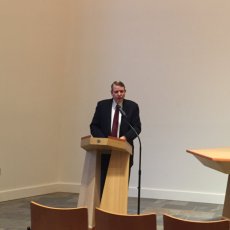
- Home
- Conferences
- Conference 2015: Liturgy and ethics
- Student weblog: Jeroen Hagendijk and Ruben van de Belt
Student weblog: Jeroen Hagendijk and Ruben van de Belt
Student participants Jeroen Hagendijk and Ruben van de Belt maintained a weblog during our 2015 IRTI conference.
Blog 1: Times Square and Reformed Theology
From all corners of the world worshippers come to visit this sanctuary. From several directions they gather at the center of the shrine. They are amazed by its glory and shine: just a glance at it energizes and fascinates them. Facing neck cramps they look up to it and marvel at the images presented. The meaning of life, the good life, is expressed in colorful compositions and the representation of the saints, embodying that good life. Those images force the believers to look up, where the flashing colors keeps drawing attention. Around the believers multiple vehicles circle around the center of the shrine, dividing the margins from the holy of holies.
As you might have been aware of at the end, I am not writing about an actual shrine or sanctuary, but about Times Square. The amazing location in downtown New York that draws millions of visitors each year to its sky reaching screens, on which commercials and logos from world famous brands and multinationals.
In comparable words, James Smith describes the local mall as a cultural liturgy: a practice that forms and shapes our identity. Central to that approach is an emphasis on the embodiment of ethics in the liturgy. Everyone worships something, desires something. For the one that might be God, for another that are the powerful images at Times Square—or maybe one thinks he or she is worshipping the first, but in reality is mostly turned to the latter. But how is it possible that those embodied images are thus formative? What does those practices have to do with ethics? What comes first: worldview or worship? What does that means for church practices? How do ethics relate to those ‘cultural’ liturgies?
An hour away from the flashing lights of Times Square is the New Brunswick Theological Seminary. Reformed theologians from all over the world are gathered here to reflect on these questions. Papers and lectures are prepared, discussion will be lively, and views will be argued. But before that is the case, we start with praying and singing for the glory of God. Does worship precedes worldview? I don’t know yet, but at least it precedes a scholarly debate.
Ruben van de Belt
Blog 2: A whole world to explore
Why should we actually talk about liturgy? Is there not any other subject relating to ethics that is more close to our beliefs or to biblical theology? Well, this question is understandable, because for a major part Reformed theology has been about beliefs: for most of us religion is about ‘believing’ things. But in a way, this focus on beliefs is rather strange, since most religions from all over the world are not about believing things, but are about participating in religious practices. Nicholas Wolterstorff sits in front of us on a park bench at the Rutgers University Campus. Wolterstorff is a well-known scholar, emeritus professor at Yale University, and writer of many books on subjects like art, Reformed epistemology, justice, and liturgy. For him, as he continues, beliefs or particular convictions are not that crucial for being religious. Yes, of course he has beliefs, however more important to him is participating in the liturgies of the church. Through decades, Reformed theologians and philosophers spent time reflecting on beliefs, but according to Wolterstorff it now seems to be more valuable to consider the church practices instead.
Only, how then are these church practices relevant to us as believers? Moreover, may we even speak of relevance when it comes to liturgy? May we presume that liturgical practices are formative to our lives? And the other way around: how do our lives relate to liturgy? When it comes to this last question, Wolterstorff has a rather strong opinion. The authenticity of liturgy, he says, depends (among other things) on how we live our lives and interact with others throughout the week. Liturgy cannot be acceptable if we behave unjust. Wolterstroff starts smiling when he says that the prophets of the Old Testament often reprimand Israelites who thought that God really liked liturgy and worship: presuming that God would be astonished by their devotion and would then overlook the rest of their lives. But that is corrupt nonsense! Our lives really matter and are related to our religious assemblies. Therefore, justice is, according to Wolterstorff, a condition for acceptable worship.
This is, obviously, a fairly fundamental notion regarding the relationship between ethics and liturgy. Justice has to be done. But this is only the beginning of exploring the field of liturgy and ethics. Since what is justice precisely and how does it relate to the Lord’s Supper for example? Shouldn’t we think of justice more intrinsic to liturgy? What does it mean to pray at Sunday morning services and how does it relate to our quotidian life? Could liturgy have something to do with our bodies and sexuality? These are just a couple of questions that pass by at our first conference day. Really, there is a whole world to explore!
Jeroen Hagendijk
Blog 3: There is an ‘I’ in ‘we’
“No, of course there isn’t an ‘I’ in ‘we!’ Where are you talking about? Neither is there an ‘I’ in team, or whatever word you might want to use to stress the importance of collaboration between individuals.” Am I correct to suspect that this is what you thought when you read the header? If so, please allow me explain that the title and give me the opportunity to convince you that there actually is an ‘I’ in ‘we.’
Let me be honest: the chance of agreeing with me largely depends on the group referred to by ‘we.’ I am not thinking about your local sports team, the faculty at your institution, or your class. No, I am thinking about the participants and the members of the International Reformed Theological Institute, gathered together in New Brunswick to discuss the relation between liturgy and ethics. Surely, there is an ‘I’ in IRTI, underling the international element of the gathering. And believe me, that isn’t an empty gesture: attendants having their homes all over the world, from South-Korea to Canada, from the Netherlands to South Africa, and even from Michigan to New York. Surely there is an ‘I’ in ‘we,’ who are here, and it is visible to all.
But that is not all: the ‘I’ stands for so much more than ‘international.’ What about intercultural? Participants reflect theologically on their own cultural context, and respond on other contributions with a seldom seen sensitivity of culture, both with regards to politics and theology. It is even possible to understand the ‘I’ as ‘interdisciplinary,’ considering that several theological approaches are standing side by side to present their research, be it historical, dogmatic, ethical, practical, and biblical-theological. Truly, the ‘I’ refers as well to an open attitude, to the possibilities offered by other methodologies and disciplines for ones own research.
Now it is time for the question of the hour: did I convince you that there is an ‘I’—or actually, an threefold meaning of it—in ‘we’? For we, the participants of the 2015 IRTI Conference, are truly ‘international,’ ‘intercultural’ and ‘interdisciplinary,’ but only due to the presence of others, only due to scientific collaboration.
Ruben van de Belt
Blog 4: Time to pray, sing, confess and listen
After three days of talking about liturgy and ethics we finally got the chance to participate in a Sunday morning service ourselves. Next to New Brunswick Theological Seminary (NBTS), on the other side of the road, lies the Second Reformed Church of New Brunswick. After all our discussions and paper presentations it was time to pray, sing, confess and listen to the Word of our God.
The congregation received us warmly. Reverend Allan Janssen, who was our host at the NBTS, provided a sermon about the story of two disciples on the road to Emmaus. In front us stood bread and wine. This Sunday we would celebrate the Lord’s Supper with the congregation members and conference participants from all over the world. We were gathered as one family, invited to feel comfortable like children at home.
During the service, some of us experienced something they had not seen before. Every now and then, this congregation arranged a prayer for healing and wholeness, led by the elders. First, as a biblical warrant, James 5:13-15 was read. After the prayer people were invited to come forward and kneel down. Hands were laid on the person kneeling and after a personal prayer they anointed her with oil. The laying on hands and the anointing were both strong gestures of mental and physical attentiveness and acceptation.
After the service we all got invited to share coffee and a huge amount of tasty cakes – we were, after all, in the US. Then, afterwards we had our lunch and made a farewell round: “Hope to see you next conference!”
Jeroen Hagendijk

